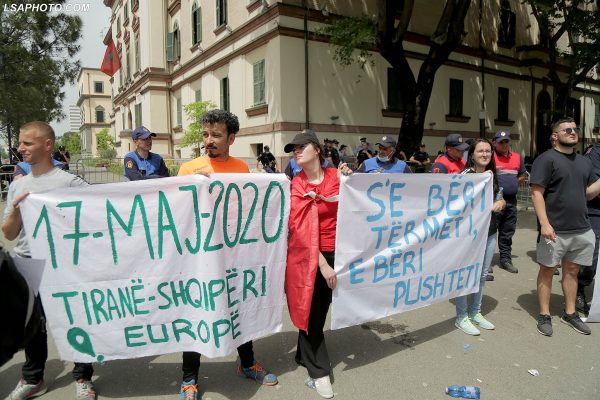*This is a translated version of the Op-Ed originally published in Albanian at Reporter.al on 18 May 2020.
Author: Alban Dafa, researcher on governance and security
May 17, the day on which the city of Tirana was to be filled with the rainbow colours of the International LGBTQA Day, was filled with the ashes and the smoke as democratic governance was destroyed through the demolition of the National Theatre.

After the demolition of the houses along the New Ring road to make room for an infrastructure project mired in corruption, the demolition of the National Theatre marks the second failure of the Albanian civic action during the second term of Mr. Rama’s government. While the government has usurped the law-making process through normative acts – which are not challenged given the absence of the Supreme Court and the Constitutional Court and the absence of a parliamentary opposition – it is necessary to understand the underlying reasons for the failures of civic action. By reflecting on them, it is possible to increase the effectiveness of civic pressure as the only way to prevent the blatant disregard of human dignity and of our inalienable human rights. To do this, we need not shy away from the truth. We should accept that in addition to state capture and the institutional vacuum created by the justice reform and the parliamentary boycott of the opposition in February 2019, the Albanian government has succeeded in disregarding the Albanian citizens’ rights and freedoms due to the lack of effective civic organisation and solidarity.
Both the protest of the New Ring residents for their right to be compensated for the demolition of their houses at market price and the protest to decide on the fate of the National Theatre through democratic deliberation were transformed to protests in the service of political party causes. For the opposition – especially after the revocation of the mandates in February 2019 – both protests were used to delegitimise the government’s policies. The government took advantage of the opposition’s participation in the protests by skilfully exploiting the presence of opposition MPs to undermine the protests’ causes by considering them politically motivated. The protesters were labelled ‘cavemen’, who oppose development. The political parties’ usurpation of both causes led to divisions among the inhabitants of the New Ring and among the actors of the National Theatre. The protesters who were not co-opted by the government chose to side with the opposition, and hoped that its political power would help their causes. Thus, the success of both protests was conditioned by the political skills of the opposition.
After the revocation of the parliamentary mandates in February 2019, the opposition relinquished part of its political power, and it became powerless after the boycott of the June 2019 local elections. To replace the loss of institutional power, the opposition called for a series of national protests to show that its popular basis was strong. The objectives of the national protests went beyond the issues of the New Ring road and National Theatre, despite serving as additional justifications for the opposition’s demands, which included the resignation of Prime Minister Rama – accused of manipulating the June 2017 parliamentary elections – and the establishment of a technical government to organise early elections.
Meanwhile, except for a few cases of mutual support to each other’s causes between the National Theatre actors and the New Ring residents, their protests were largely disconnected in time and space from each other. Furthermore, the mainstream media did not consistently cover the protests, which meant that the two causes could reach national prominence only by becoming part of the protests organised by the opposition. Given the politically divisive and charged climate of the public discourse and the general public’s distrust of Albanian politicians – who have consistently demonstrated to be corrupt and unaccountable – the ultimate failure of the two causes was to be expected.
It would have certainly been naive to believe that the opposition’s politicians, who have consistently shown a lack of integrity just like their colleagues from the ruling party, had suddenly become devoted to public service. But these were not the first cases that the political opposition has exploited civil and human rights causes to come to power and then betray the public trust. On 21 January 2011 the Socialist Party – in opposition – called a national protest after a leaked video showed that President Meta – deputy prime minister at the time – had been engaged in corruption and cronyism. Despite the fact that four unarmed protesters – who were protesting against government corruption – were shot and killed by the National Guard, in April 2013 Mr. Rama signed a coalition agreement with Mr. Meta.
It is important to emphasise that despite the profound disappointment from being manipulated by party politics, Albanian citizens still do not fully appreciate that the Albanian political party infrastructure – which is based in backroom deals – will never be able to protect their rights. In the last 30 years, political parties have organised and mobilised the citizenry to support and hence provide legitimacy to policies designed precisely against the public interest. After political parties lose their power due to incompetence, corruption, and lack of democratic deliberation, they return to the citizenry to regain their trust only to betray them after regaining power, thus perpetuating a continuous vicious cycle. The only solution to break this cycle is civic organisation and solidarity.
Albanian citizens should understand that their interests are not fragmented and separate, but common and interconnected. When someone else is unjustly deprived of one’s property and livelihood, all citizens are deprived; when someone else is forbidden to protest and exercise one’s right to free speech, everyone is forbidden. Only through social solidarity and organisation can the citizenry run its own affairs and decide on its own fate. Social solidarity is a gateway for the citizens to appreciate their own power and to realise that only through effective organisation can they hope to protect their rights. The alternative is a boot stamping on their faces forever.



